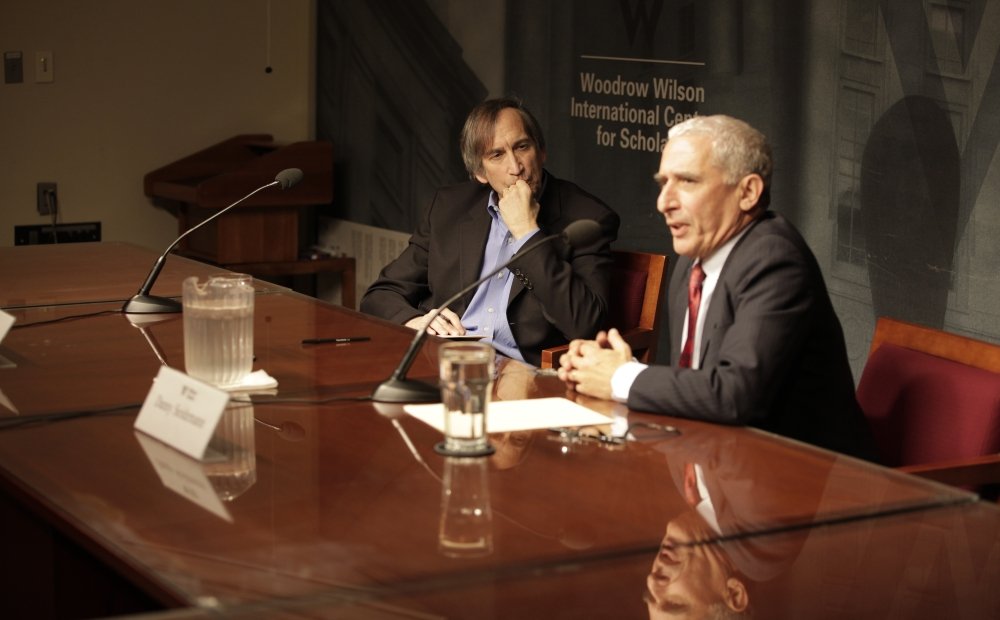Jerusalem in Crisis? A Conversation with Danny Seidemann

Two experts engaged in a conversation about the increasing tension and violence in Jerusalem and the broader Israeli-Palestinian conflict.
On December 1, 2014, the Joseph and Alma Gildenhorn Middle East Forum of the Middle East Program at the Woodrow Wilson Center held a conversation “Jerusalem in Crisis? A Conversation with Danny Seidemann” with Danny Seidemann, a leading expert on geopolitical Jerusalem. Aaron David Miller, Vice President for New Initiatives and Distinguished Scholar, Woodrow Wilson Center, conducted the conversation.
Miller opened the discussion by explaining that Jerusalem serves as the best context through which to analyze the tensions building in Israel and the Palestinian territories, because the city contains many different overlapping issues. He highlighted a number of efforts that have unsuccessfully approached the sovereignty issue of the city and asked Seidemann how the situation in Jerusalem is different than in the past.
While he was able to travel comfortably to East Jerusalem during the second intifada (2000-2005), Seidemann stated that the current environment has made it unsafe for him to venture into that part of the city. He revealed that Jerusalem is as divided as it has ever been and characterized the new unrest as a more popular uprising than the second intifada. The personalization of violence in Jerusalem and the radicalization of attitudes toward the Temple Mount have created the “perfect storm” for the conflict, Seidemann explained. He suggested that there are tribal attitudes on both sides that motivate individuals to inflict as much pain as possible on the other side. Often, the only place for retaliation in this conflict is in Jerusalem.
Responding to Miller’s inquiry about whether a two-state solution is still possible, Seidemann explored the different dimensions of such a solution. Regarding the territorial dimension, he stated that the number of Israeli settlers in the West Bank that would need to be removed to satisfy certain conditions is growing. He warned that the clash over the Temple Mount contains seeds that could morph the conflict from a national-political one into a religious one that does not offer hope for achieving a solution. Seidemann noted, however, that nothing has happened in Jerusalem yet that would make a two-state solution impossible. Although Israeli leadership has not had the capacity to realize it, he concluded by stressing his belief that a two-state solution is still within reach.
In the question and answer portion of the conversation, Seidemann explained that the recent Israeli nation-state bill is impactful because it emphasizes the concept that in Israel, Jewish citizens count but Arab citizens do not. He highlighted the need to constantly display the realities of both sides of the conflict in the United States and for American leaders to engage Israel critically, rather than simply denouncing or supporting the state. Regarding a known solution to the conflict, he discussed the need for a hard border in Jerusalem and a national capital on each side, noting that the question will then be how the Palestinian capital is integrated with the rest of the Palestinian state. Miller ended the conversation by underlining his belief that the greatest impediment to lasting peace has been a lack of effective leadership in Israel, the Palestinian territories, and the United States.
By John Daniels, Middle East Program
Speakers

Hosted By

Middle East Program
The Wilson Center’s Middle East Program serves as a crucial resource for the policymaking community and beyond, providing analyses and research that helps inform US foreign policymaking, stimulates public debate, and expands knowledge about issues in the wider Middle East and North Africa (MENA) region. Read more
